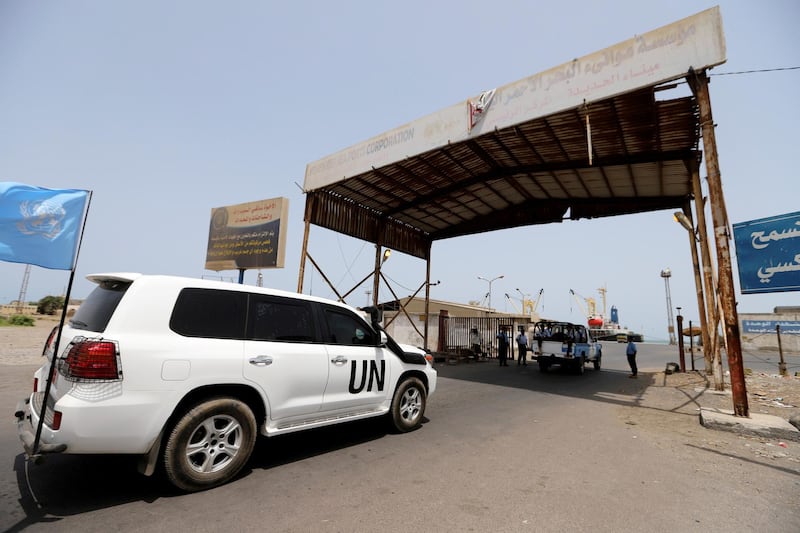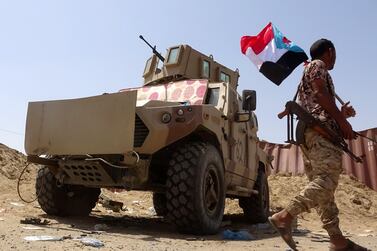Yemen’s peace negotiations could “slip away” if an agreement is not reached soon, leading to a new phase of violence and economic decline, the UN’s envoy to the country said on Tuesday.
The country has been mired in conflict since the Iran-aligned Houthi group ousted the government of President Abdrabu Mansur Hadi from the capital Sanaa in late 2014.
“There is a real risk that these negotiations will slip away, and that Yemen will enter a new phase of prolonged escalation, uncontrolled spread of Covid-19 and economic decline,” Martin Griffiths said during an online briefing to the UN Security Council.
Mr Griffiths cited a "delicate" and "challenging" negotiation ahead towards finalising a political settlement that must reach success before the "current window of opportunity" closes.
The negotiations aim to reach a joint declaration on a nationwide ceasefire, economic and humanitarian measures, and the resumption of the political process aimed at comprehensively ending the conflict.
The UN official lamented the "worst of times" for Yemen.
“As mediator, I continue to attempt to bridge the divides between the parties’ positions. I hope they will make the compromises necessary to reach an agreement,” he said.
He warned that even as the negotiations continue life for Yemenis across the country life had become "even more unforgiving".
Food prices are rising as the country’s economy deteriorates, he said, adding that most of the public do not have enough money to meet their basic needs.
Steps must be agreed on to keep the economy out of the conflict, he said.
“It is the people of Yemen who suffer when the economy is weaponised and politicised,” the envoy said.
Mr Griffiths urged the Houthis to allow UN experts access to an oil tanker moored off the coast and in danger of leaking.
The FSO Safer is loaded with 1.1 million barrels of crude. The Houthi rebels, who control the area, have denied UN inspectors access to the vessel.
In early July, the Houthis confirmed in writing that they would authorise a long-planned, UN-supervised technical mission to the tanker.
“But we are still awaiting the permissions necessary for this team to deploy,” Mr Griffiths said.
If the UN team is granted access they would assess the condition of the tanker, undertake any initial possible repairs, and formulate recommendations on what further action is required.
“An independent and expert-driven assessment is critical to allowing us to fully understand the scope and size of the issue and the possible solutions,” Mr Griffiths said.
The UN warned earlier this month of an environmental, economic and humanitarian catastrophe from the ship, which has not been maintained for over five years.
Experts have raised concerns that the tanker could explode or leak, causing massive environmental damage to Red Sea marine life.
On the Riyadh agreement, Mr Griffiths welcomed the continued efforts between the government and the Southern Transitional Council (STC) to reactivate the implementation of the deal that would end a power struggle in southern Yemen.
Last year, Saudi Arabia brokered a peace deal, referred to as the Riyadh Agreement, between Yemen’s internationally recognised government and the Southern Transitional Council after clashes erupted between forces allied to the two sides in Aden.
The southern city has been the interim seat of Mr Hadi's administration since the Houthis took control of Sanaa in a coup in late 2014.
Mr Griffiths comments came as the Minister of State for Foreign Affairs, Dr Anwar Gargash, said on Tuesday, that the deal's developments are "encouraging”.
“We hope that the Yemeni government and the Southern Transitional Council will overcome [their differences] and agree to the strategic vision on narrow tactical gains,” Dr Gargash said on Twitter.
تطورات استئناف تنفيذ اتفاق الرياض مشجعة. كلنا أمل أن تغلّب الحكومة اليمنية والمجلس الانتقالي الجنوبي الرؤية الاستراتيجية للاتفاق على المكاسب التكتيكية الضيقة. فعودة الثقة تتطلب تقديم التنازلات والتنازلات المقابلة.
— د. أنور قرقاش (@AnwarGargash) July 28, 2020
والشكر والتقدير للجهد السعودي الذي لا يكل ولا يتعب.
In April, the STC declared a plan to move towards self-rule, accusing the government of delaying a Cabinet shake-up.
Since then, clashes between the nominal allies have added to Yemen’s woes and complicated efforts protect Yemen’s fractured health system from the novel coronavirus.
“Restoring confidence requires making concessions,” Dr Gargash said.
The top official thanked Saudi Arabia for its efforts in implementing the peace deal.
Dr Gargash's comments come as ambassadors from the permanent members of the UN Security Council to Yemen stressed the importance of implementing the deal on Sunday.
Mr Griffiths must be supported "in order to find a comprehensive solution" to the crisis, the ambassadors said during a meeting with Yemen's Foreign Minister Mohamed Al Hadhrami.
Mr Al Hadhrami told the ambassadors that his government will "remain engaged with Mr Griffiths and the UN peace process based on measures that will "alleviate the suffering of the Yemeni people".
Yemen has been mired in violence that has killed more than 100,000 people since 2015, according to the UN.
The fallout from the Houthi coup of 2014 has led Yemen to be labelled as one of the world’s most desperate humanitarian disasters.







